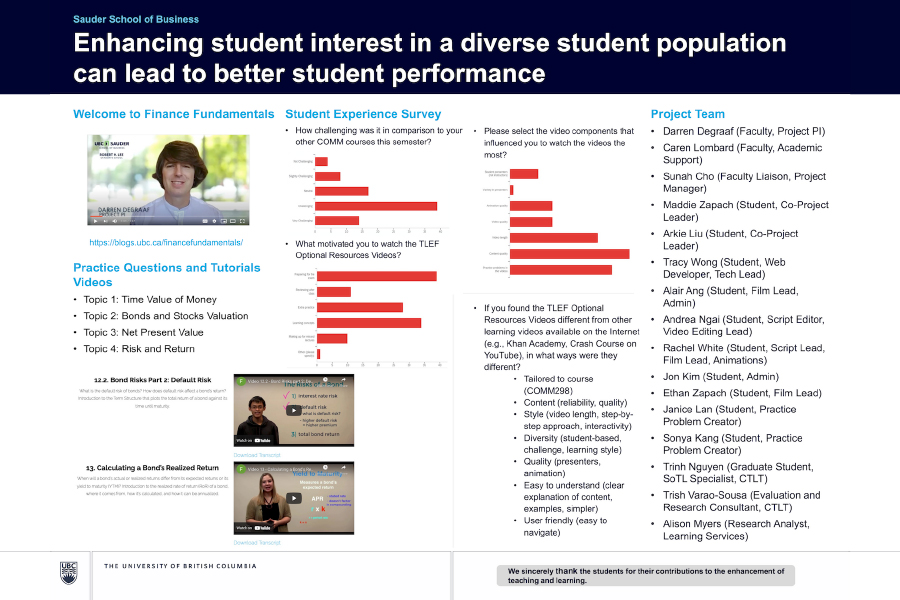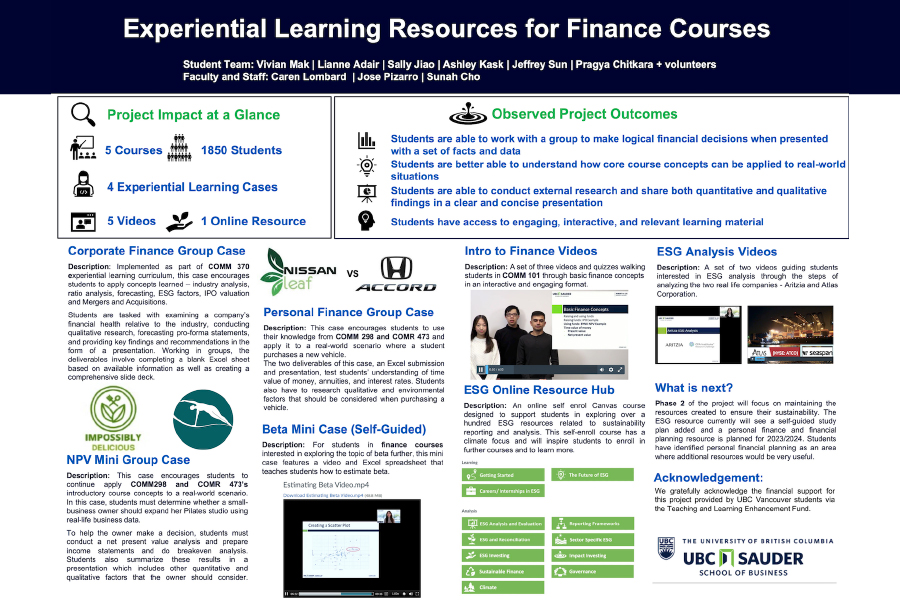Teaching and learning at UBC is constantly undergoing changes that transform the student learning experience through innovations. Instructors play a central role in this process, thanks to their dedication to better prepare their students for their professional lives. And with institutional support such as the Teaching and Learning Enhancement Fund (TLEF), they can build upon each other’s goals and create learning experiences that benefit everyone involved. Throughout the years, the UBC Sauder School of Business has been a prime example of successfully using emulation, to create experiential learning opportunities and help students better understand challenging financial concepts and be ready to thrive in the constantly evolving world of financial markets.
From developing supplemental material to creating core course content
Accomplishing that goal was one of Full-Time Lecturer Darren Degraaf and his team’s primary objectives when they received a Small TLEF to design supplemental materials for his COMM298 Introduction to Finance class.
Developed in 2019, the project aimed to develop instructional videos and online quizzes with detailed feedback to enhance students’ understanding of key financial concepts, and improve their performance. Topics included time and value of money, bonds and stocks valuation, as well as net present value and risk and return.
“Introduction to Finance, a required course for every Sauder Business School’s Bachelor of Commerce student in the second year, is regarded as one of the most conceptually challenging courses,” Darren explains. One reason is that, because of the traditional format of live lectures, some students would struggle with the pace of the course, which could create misunderstandings that would be challenging to catch up on. “The goal of this project was to develop various resources and learning activities that could provide students with adaptable resources, allowing them to learn and review difficult concepts at their own pace.” UBC Sauder instructors, students and members of the Centre for Teaching, Learning and Technology contributed in the development of this project.

The flexibility and ease of use of these resources received overwhelming approval from students who used them to review challenging concepts at their own pace. They often cited the clarity of concepts, usefulness of practice exercises, as well as the flexibility and quality of the instructional materials. They also lauded how tailored to the courses these resources were, especially when compared to other learning videos available on the Internet.
The format of the materials proved timely when the university had to temporarily move away from in-person teaching in March 2020. “With the shift to online learning due to COVID-19, the value placed on these resources increased significantly, leading to greater utilization by students,” remembers Darren. “Fortunately, the project outputs remained sustainable, serving as valuable resources for any introductory finance course, thus ensuring long-term benefits beyond the initial project scope.”
What’s more, the project provided a blueprint within the business school for other instructors to emulate Darren’s project, apply for TLEF funding, and develop learning experiences that enhance students’ knowledge. “I would be humbled and grateful if this success in any way inspired my colleagues teaching different sections of the course to create similar learning resources for other finance courses.”
Creating experiential learning cases for Finance students
The success of the original TLEF project resonated with other Sauder instructors, including Full-Time Lecturer Caren Lombard, who was a member of Darren’s team, and Sessional Lecturer Jose Pizarro. “The original Finance TLEF project helped students where they were on their journey to learning Finance,” Caren explains. “The bite-sized videos and quizzes helped students who needed extra practice to understand course content, while giving students who wanted to learn more have other opportunities to hone their skills.”
For the new project, the goal was not only to take inspiration from Darren and his team’s work, but to build upon the original concept and take it further by including the materials as parts of the core course content, rather than supplemental materials.
The idea took the form of “Experiential Learning Cases for Finance Courses,” another Small TLEF project developed in 2022/23 that spanned over five courses and consisted in four experiential learning cases, five videos, and one online resource that, in total, were used by 1,850 UBC Sauder students. Additionally, it changed the dynamic of a program that used to rely primarily on more conventional approaches to learning. “Finance courses were traditionally heavily focused on exams,” explains Caren. “We wanted to move away from that, and introduce more experiential learning components into the courses that all business students take.”

The updated format, topics covered and approach were also a way for the project team to prepare students for their professional life after graduation. “Introducing experiential components would allow students to work in groups and apply their skills to real-life situations,” Caren details. “We decided to develop three smaller cases for the “Introduction to Finance” course, as well as a more comprehensive case for the “Corporate Finance” course.”
Among the examples, the team chose a situation where a student had to decide between purchasing an electric or a combustion engine vehicle for one of the smaller cases, while the more comprehensive project involved analyzing growth opportunities for a fictional plant-based food company. For each case, students were expected to work as a group and communicate their findings through a presentation format, thus developing their communication skills in the process.
Along the way, students could also rely on support from other students hired thanks to TLEF funding, to prepare the cases and create training materials for the courses. “They were crucial in the cases as they were seniors who understood the student perspective and the learning objectives that instructors had with the case,” Caren describes. “Without our TLEF student team, creating these materials and supporting the implementation and grading would not have been possible.”
“I consider the cases developed to be an excellent experiential learning component of the course, allowing students to apply and explore realistic applications while using tools that are fundamental for any financial professional,” Jose continues. “These cases definitively benefited the students and successfully created learning materials that are highly relevant and directly complement class discussions.”
Emulating knowledge to stay up to date and relevant
One of the founding principles of the TLEF is to enrich student learning by supporting innovative and effective educational enhancement. By emulating existing projects within the same faculty or department – and building from them – instructors and students can reach that goal in a sustainable way while keeping pace with industry standards.
“The cases developed in the TLEF project allowed students to apply the theoretical concepts discussed in class to highly realistic scenarios,” Jose explains. “In particular, the design of these cases exposed the students to realistic problems with high industry relevance, such as assessing the pros and cons of multiple sources of financing, valuing small businesses, and using financial data to analyze the risk of a stock. All these applications are foundational to any financial professional and necessary for a graduating student.”
As such, building upon these resources is no longer an objective, but a priority, as Jose continues. “Financial markets are constantly evolving. For this reason, all cases developed require significant term-by-term updates […] to retain the objective of providing a novel experiential learning component with high industry applicability.” Thus, the team is looking at expanding the resources developed in the TLEF project. For example, the Environmental, Societal and Governance (ESG) online resources hub, originally designed to support students in exploring ESG resources related to sustainability reporting and analysis, will see a self-guided study plan added. Additionally, the team plans to add a personal financial planning tool, an area identified by students as needing more personalized resources in the future.
Being a member of a TLEF project is also a formative experience for the students involved in designing the resources, as it can help make themselves more relatable to other students and use their gained knowledge after graduation when starting their professional careers. “Developing cases for COMM 298 through the TLEF project has been an incredible experience, allowing me to collaborate with different instructors, create engaging assignments, and determine how to combine real-world issues with key course concepts,” explains Lianne Adair, a member of the TLEF student team. Sally Jiao, another student assistant, highlighted the benefits of developing realistic projects for students within the course. “I felt that the cases provided students with a realistic preview of the work that is typically done in Finance. […] I liked developing a case that had continuity. The multiple chapters allowed students to follow along and develop new insights with each part, much like an equity analyst would!”
What began as a set of supplemental resources to help students better understand key financial concepts for a course, has evolved into a key experiential learning experience project at the core of the Finance program at UBC Sauder Business School. Thanks to instructor support, student collaboration, and TLEF funding, the projects are benefitting not only current students, but also future employers and society at large by training graduates better equipped to handle real-world financial challenges. “Due to the size of the courses, these additional materials and training of TAs was an imperative to ensure that introducing cases into large courses would not be a burden on instructors.”
Of course, as Jose points out, the results built upon these two projects will need to be keep being supported, either by the team or through a new TLEF project, to retain their relevancy for students. “Although we consider this TLEF project a success in developing excellent experiential learning tools for our students, its future lies exclusively in our ability to update and modify the constructed cases,” Jose concludes. “To keep their power and success, we need to commit to continue improving and working with them, so they keep benefiting students for years to come.”
Are you interested in learning more about the TLEF?
Discover more stories about innovative projects led by UBC faculty, staff and students. You can also fin information about current and past TLEF projects, details about upcoming funding calls for proposals.
